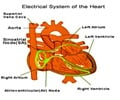People who suffer an ischemic stroke and also have an abnormality in the heart's electrical cycle are at a higher risk of death within 90 days than people who do not have abnormal.
People who suffer an ischemic stroke and also have an abnormality in the heart's electrical cycle are at a higher risk of death within 90 days than people who do not have abnormal electrical activity at the time of emergency treatment, according to new research.
The study also provides a threshold at which the threat of death is highest: QTc intervals greater than 440 milliseconds in women and 438 milliseconds in men have the worst prognosis. The findings are published online March 20, 2009, in the Journal of Stroke and Cerebrovascular Diseases."From a clinical perspective, our study offers additional parameters to consider while treating stroke patients in the Emergency Department setting,' said corresponding author Latha G. Stead, M.D., professor and chair of the Department of Emergency Medicine at the University of Rochester Medical Center, who recently joined the URMC from the Mayo Clinic. "It appears that reviewing the medications a patient is taking and looking specifically for those that might prolong the QTc interval would be a useful practice."
The QTc interval is a measure of the electrical activity of the heart. An ECG records the waves of activity and its pattern, which is labeled with letters Q and T. Doctors look for the appropriate intervals between each letter, showing that the heart's electrical signals are steadily passing through the ventricles. A prolonged QTc interval means it takes too long for the electrical signal to pass.
Prolonged QTc intervals can be the result of a rare genetic disorder, medications, electrolyte imbalances, or congenital heart disease. Scientific data on the relationship between abnormal QTc intervals and death has been inconsistent, and few studies have looked at this relationship in the context of acute ischemic stroke, Stead said.
Researchers studied the medical records of 345 ischemic stroke patients at the Mayo Clinic, treated between 2001 and 2004, and followed for 90 days. Further analysis was done to see if the researchers could identify a QTc cutoff that would accurately predict death within 90 days.
About 35 percent of the patients had a prolonged QTc interval at the time of the emergency department visit. An estimated 81 percent of all patients were expected to survive the next three months. However, results showed that only 70.5 percent of the patients with a prolonged QTc interval survived compared with 87.1percent of the patients without a prolonged QTc interval.
Advertisement
About 795,000 Americans each year suffer a new or recurrent stroke. That means, on average, a stroke occurs every 40 seconds, according to the American Stroke Association. Ischemic strokes, obstructions of the blood vessels supplying blood to the brain, account for the majority of cases.Stead is supported by the Mayo Foundation Emergency Medicine Career Research Career Development Award.
Advertisement
SRM














